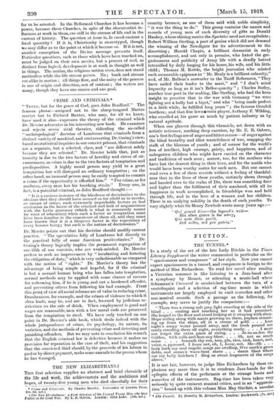THE NEW ELIZABETHANS:I - Tests first selection supplies an abstract and
brief chronicle of the life and work, the achievements and the ambitions and hopes, of twenty...five young men who died cheerfully for their
• Crime and Criminate. By Charles Mercier. tinlverallY of leaden Press. 10s. ed. net.)
1 The Nem Rtimbdhart a Fir et Selretion of (he Limo! rouse Mrs who hare talks is Me Great War, By E. D. Osborn. London ; Jaen lace, Lies. net.) country became, as one of them said with noble simplicity, "it was the thing to do," This, group contains the names and records of young men of such diversity of gifts as Donald Mulkey, whose shining merits the Spectator need not recapitulate; Robert William Sterling, a poet of genius which did not demand the winning of the Newdigate for its advertisement to the discerning ; Harold Chapin, a brilliant dramatist in early accomplishment, and not only in promise, who hated the gre- gariousness and publicity of Army life with a deadly hatred intensified by daily longing for his home, his wife, and his little child ; Thomas H. Kettle, the bright journalist who minted such memorable epigrams as " Mr. Healy is a brilliant calamity," and, of Mr. Balfour's surrender to the Tariff Reformers, "They have nailed their leader to the mast," and " I don't mind loquacity so long as it isn't Belloc-quacity " ; Charles Sorley, another true poet in the making, like Sterling, who had the keen insight to perceive that in the war with Germany "we were fighting not a bully but a bigot," and who "being made perfect in a little while, he fulfilled long years " ; the famous Grenfell brothers; and that fine lawnetennis player, Anthony F. Wilding, who excelled at his game as much by patient industry as by natural aptitude.
When one glances through this 'chronicle, set down with an artistic reticence., masking deep emotion, by Mr. E. B. Osborn, one's first feelings are of anger and bitter sortow— of anger against the blind brutality and idiot wastefulness of war, snapping the stalk of the blossom of youth ; and of sorrow for the world's loss of intellect, high courage, gaiety, and happiness, and of unbegotten children who might have carried on the character and traditions of such men ; sorrow, too, for the mothers who have lost the dearest thing in their lives, and for the maids who would have been worthy mites for such men. But one cannot read even a few of these records without a feeling of thankful. ness that in the lives of these youths, untimely shorn through and handed over to the realm of Die, there was something finer and higher than the fulfilment of their manhood, with all its happiness in work accomplished, in friendships won and held through life, and in the love of a woman and her children. There is an undying nobility in the death of such youths. To vary slightly what Sir Henry Newbolt wrote many Years ago :— "Qni procul hine—the legend's writ—•• His alien grave is far away, Qui ante diem periit,
Sal miles, seal pro patria."






































 Previous page
Previous page